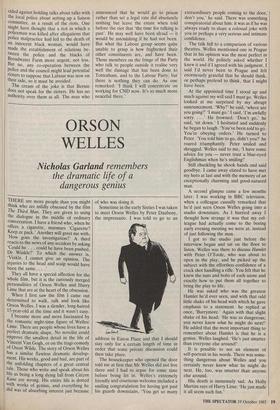ORSON WELLES
Nicholas Garland remembers
the dramatic life of a dangerous genius
THERE are more people than you might think who are mildly obsessed by the film The Third Man. They are given to using the dialogue in the middle of ordinary conversation. I have a friend who, when he offers a cigarette, murmurs 'Cigarette? Keep ze pack.' Another will greet me with, `How goes the investigation?' A third reacts to the news of any accident by asking `Could he . . . could he have been pushed, Dr Winkle?' To which the answer is, Winkle. I cannot give an opinion. The injuries to the head and scalp would have been the same. . .
They all have a special affection for the whole film, but it is the curiously merged personalities of Orson Welles and Harry Lime that are at the heart of the obsession.
When I first saw the film I came out determined to walk, talk and look like Orson Welles. I was a slender, long-haired 15-year-old at the time and it wasn't easy.
I became more and more fascinated by the romantic night-time figure of Welles/ Lime. There are people whose lives have a perfect dramatic shape. No novelist could improve the smallest detail in the life of Vincent Van Gogh, or on the tragi-comedy of Oscar Wilde. The story of Orson Welles has a similar flawless dramatic develop- ment. His works, good and bad, are part of the unfolding chapters of a great central tale. Those who write and speak about his life as being a long dying fall from Citizen Kane are wrong. His entire life is dotted with works of genius, and everything he did was of absorbing interest just because
of who was doing it.
Sometime in the early Sixties I was taken to meet Orson Welles by Peter Daubeny, the impressario. I was told to go to an 4400'4 address in Eaton Place and that I should stay only for a certain length of time in order that some private discussion could then take place.
The housekeeper who opened the door told me at first that Mr Welles did not live there and I had to argue for some time before being let in. Welles's extremely friendly and courteous welcome included a smiling congratulation for having got past his guards downstairs. 'You get so many extraordinary people coming to the door, don't you,' he said. There was something conspiratorial about him: it was as if he was always ready to share a colossal joke with you or perhaps a very serious and intimate confidence.
The talk fell to a comparison of various theatres, Welles mentioned one in Prague that in his opinion was the most perfect in the world. He politely asked whether I knew it and if I agreed with his judgment. I said I'd never been to Prague and felt enormously grateful that he should think, or perhaps pretend to think, that I might have been.
At the appointed time I stood up and much against my will said I must go. Welles looked at me surprised by my abrupt announcement. 'Why?' he said, 'where are you going?' I must go.' I said, 'I'm awfully sorry. . . .' He frowned. 'Don't go,' he said, 'sit down.' I hesitated and suddenly he began to laugh. 'You've been told to go. You're obeying orders.' He turned to Peter. 'You told him to go, didn't you?' he roared triumphantly. Peter smiled and shrugged. Welles said to me, 'I have some advice for you — never trust a blue-eyed Englishman when he's smiling!'
Still chuckling he shook hands and said goodbye. I came away elated to have met my hero at last and with the memory of an exceptionally charming and good-natured man.
A second glimpse came a few months later. I was working in BBC television, when a colleague casually remarked that he'd just seen Orson Welles going into a studio downstairs. As I hurried away I thought how strange it was that my col- league had actually come to the boring early evening meeting we were at, instead of just following the man.
I got to the studio just before the interview began and sat on the floor to listen. Welles was there to discuss Hamlet with Peter O'Toole, who was about to open in the play, and he picked up the subject with the effortless confidence of a crack shot handling a rifle. You felt that he knew the nuts and bolts of each scene and exactly how to put them all together to bring the play to life.
He was asked who was the greatest Hamlet he'd ever seen, and with that odd little shake of his head with which he gave emphasis to a statement he replied at once, `Barrymore.' Again with that slight shake of his head: 'He was so dangerous; you never knew what he might do next!' He added that the most important thing to remember about Hamlet is that he is a genius. Welles laughed. 'He's just smarter than everyone else around!'
It is possible to see an element of self-portrait in his words. There was some- thing dangerous about Welles and you certainly never knew what he might do next. He, too, was smarter than anyone else around.
His death is immensely sad. As Holly Martins says of Harry Lime: 'He just made it all seem such fun.'


















































 Previous page
Previous page